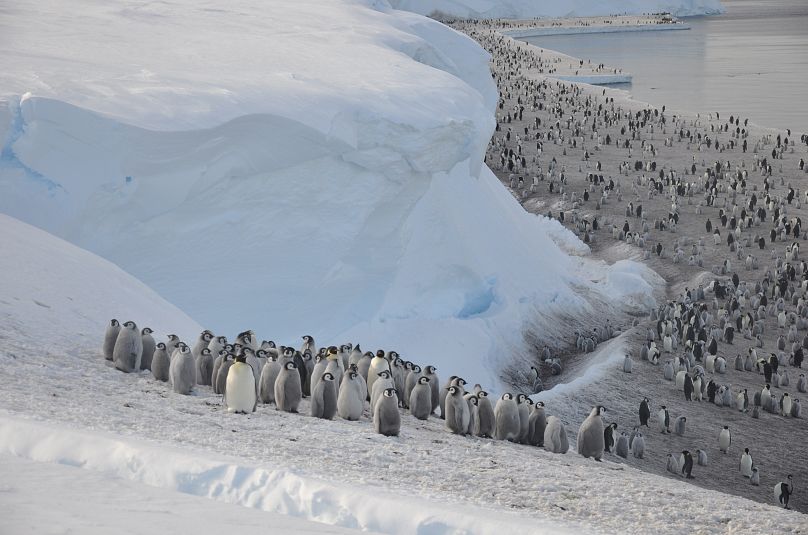Research has found that sea ice around Antarctica has decreased significantly in the last seven years.
Emperor penguins in Antarctica have experienced unprecedented breeding failure as a result of sea ice loss, a new study has found.
 ADVERTISEMENT
ADVERTISEMENT
 ADVERTISEMENT
ADVERTISEMENT
In one region of Antarctica where there was total sea ice loss in 2022, chicks from four out of five colonies perished.
The findings support predictions that over 90 per cent of emperor penguin colonies will be quasi-extinct by the end of the century,
Here’s how global warming trends are imperilling the species.
100 per cent sea ice loss in areas of Antarctica
Research has found that sea ice around Antarctica has decreased significantly in the last seven years.
By the end of December 2022, sea ice extent was the lowest experienced in 45 years according to satellite image records.
The most extreme loss was seen in the central and eastern Bellingshausen Sea region, west of the Antarctic Peninsula, where there was a 100 per cent loss of sea ice in November 2022.
In this zone, sea ice didn’t start to re-form until late April 2023.
Warming seas endanger emperor penguins
A new study, published in Communications Earth & Environment earlier this week, found that melting sea ice poses a major threat to emperor penguins.
Researchers from the British Antarctic Survey (BAS) studied colonies in the central and eastern Bellingshausen Sea region.
They concluded that there was a high probability that no chicks survived from four out of five emperor penguin colonies in the area in 2022.
“We have never seen emperor penguins fail to breed, at this scale, in a single season,” says lead author of the study, Dr Peter Fretwell.
“The loss of sea ice in this region during the Antarctic summer made it very unlikely that displaced chicks would survive.”
The scientists examined satellite images showing sea ice loss at breeding sites well before chicks would have developed waterproof feathers.
Emperor penguins depend on stable sea ice firmly attached to the shore - dubbed ‘land-fast’ ice - for the majority of the year from April to January.
Once they arrive at their chosen breeding site, penguins lay eggs during the Antarctic winter from May to June. The eggs hatch after 65 days, but the chicks do not fledge until summer, between December and January.
Between 2018 and 2022, 30 per cent of the 62 known emperor penguin colonies in Antarctica were affected by partial or total sea ice loss, according to the study.
“We know that emperor penguins are highly vulnerable in a warming climate - and current scientific evidence suggests that extreme sea ice loss events like this will become more frequent and widespread," adds Fretwell.
90 per cent of emperor penguin colonies risk extinction
Emperor penguins have previously responded to incidents of sea ice loss by moving to more stable sites the following year. But, scientists say that this strategy won’t work if sea ice habitat across an entire region is affected.
Climate change is considered the only major factor influencing long-term population change of emperor penguins.
Recent predictions paint a bleak picture: if present rates of warming continue, over 90 per cent of colonies will be quasi-extinct by the end of this century.
“This paper dramatically reveals the connection between sea ice loss and ecosystem annihilation,” says Dr Jeremy Wilkinson, a sea ice physicist at BAS.
“It is another warning sign for humanity that we cannot continue down this path, politicians must act to minimise the impact of climate change. There is no time left.”











